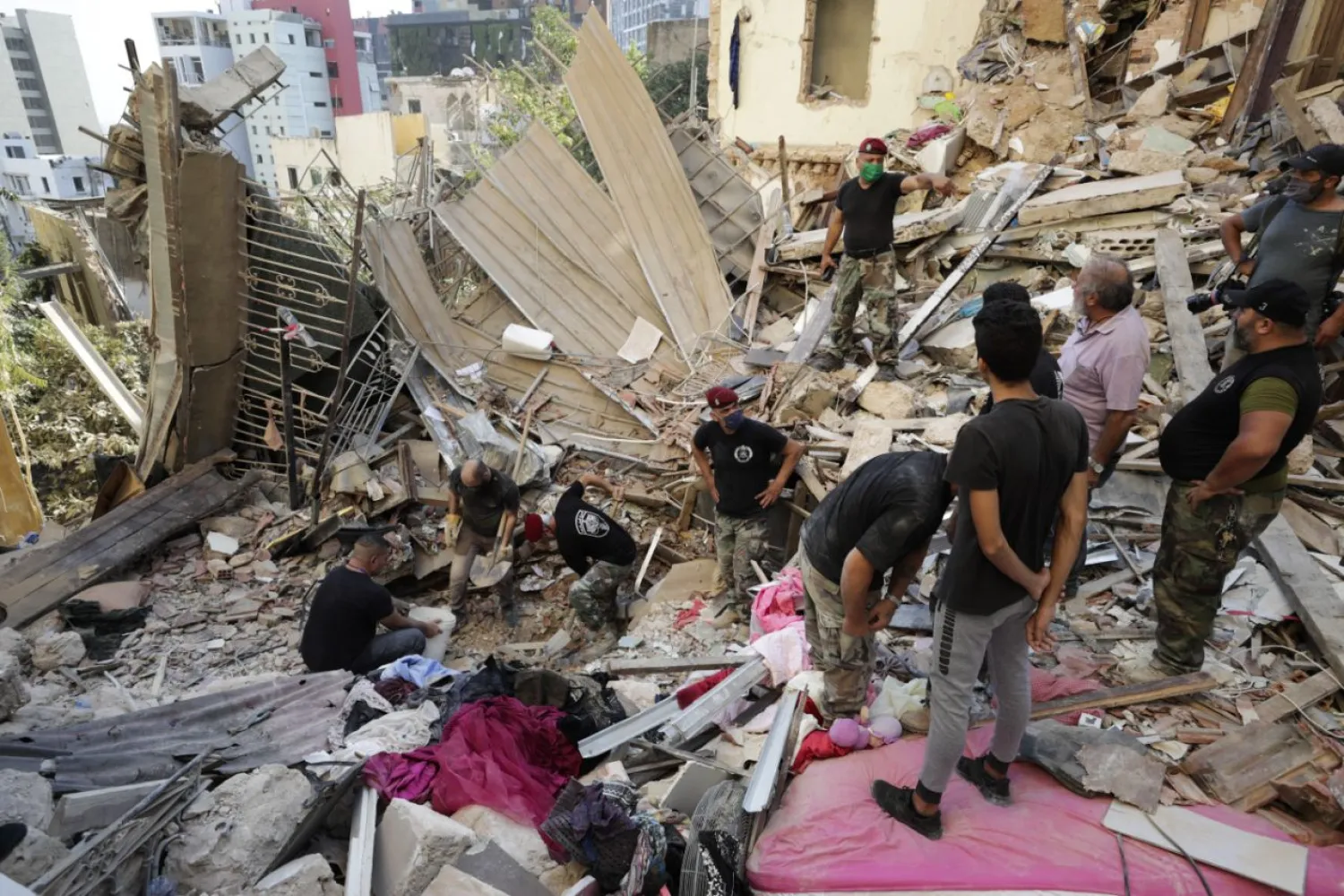Emergency medical aid and pop-up field hospitals were dispatched to Lebanon Wednesday along with rescue experts and tracking dogs, as the world reached out to the victims of the explosion that devastated Beirut.
The blast centered on the city's port caused massive destruction and killed at least 113 people, heaping misery on a country already in crisis.
Gulf states were among the first to respond. Saudi-funded medical teams were dispatched from north Lebanon to Beirut to care for and to help transport the wounded on Tuesday, while a specialized team from a Saudi-funded medical center provided emergency health care services in the Lebanese capital, according to the state-run Saudi Press Agency.
Medical supplies from Kuwait also arrived, as the Lebanese Red Cross said more than 4,000 people were being treated for injuries after the explosion, which sent glass shards and debris flying.
Jordan's King Abdullah II also promised to dispatch a field hospital. The United Arab Emirates sent 30 tons of medicines, medical supplies and surgical equipment. Qatar sent mobile hospitals to ease pressure on Lebanon's medical system, already strained by the coronavirus pandemic.
Britain promised a 5-million-pound ($6.6 million) humanitarian support package for Lebanon. Foreign Secretary Dominic Raab said Wednesday that search and rescue teams and expert medical support are ready to be sent. He added that a Royal Navy ship already in the area can also be deployed to help assess the damage to Beirut’s port.
Raab said he spoke Wednesday to Lebanese Prime Minister Hassan Diab, who he said promised a “full, thorough and rigorous” investigation into the blast, and accountability for those responsible.
The Hungarian government said it is donating 1 million euros ($1.2 million) for rescue, salvage and reconstruction efforts.
A Greek C-130 army transport plane bearing a dozen rescuers landed at Beirut's airport, itself damaged in the catastrophic explosion.
Diab has called on "friendly countries" to support a nation already reeling from its worst economic crisis in decades as well as the impact of the coronavirus.
As emergency crews hauled survivors from the rubble of demolished buildings, France said it was sending search and rescue experts aboard three military planes loaded with a mobile clinic and tons of medical and sanitary supplies.
President Emmanuel Macron is to travel to Lebanon on Thursday, becoming the first world leader to visit Beirut after the disaster, as France seeks to swiftly push reconstruction in its former colony.
"France is at the side of Lebanon. Always," Macron tweeted in Arabic.
Cyprus -- which lies just 150 miles (240 kilometers) to the northwest and where Tuesday's blast were both heard and sighted -- said it was sending eight police tracking dogs and their handlers aboard two helicopters, to help in the search for victims trapped under rubble.
Tunisia offered to send medical teams to collect 100 wounded people and evacuate them for treatment, as well as sending in two military transporters carrying food and medical aid.
From Europe, authorities in the Netherlands, Czech Republic and Poland offered an array of assistance including doctors, police and firefighters, together with rescue experts and sniffer dogs.
'Stay strong, Lebanon'
The World Health Organization said it was dispatching trauma and surgical kits from its base in Dubai after what it called a "shocking event" that comes at a "particularly difficult time in Lebanon".
"As you've seen, many hospitals are overwhelmed with casualties and people are still looking for the injured and the dead, so it's a very sad day," the UN agency's emergencies director Michael Ryan told an online session.
Meanwhile, Russian emergency officials said the first plane with medical workers and equipment for a make-shift hospital had left the country and was en route to Beirut. Four more flights were due to follow in the next 24 hours with more rescuers and medical workers, as well as equipment for a coronavirus testing lab and protective gear.
Some 150 Russian personnel will be deployed to Lebanon to help deal with consequences of the explosion that devastated Beirut.
Norway offered 25 million kroner ($2.74 million) and 40 tons of medical equipment to Lebanon after the huge explosion in the harbor of the Lebanese capital.
“The situation is pretty confusing right now. In the coming days we will know more about what is needed in the long-term,” Norwegian Foreign Minister Ine Eriksen Soereide told reporters on Wednesday.
She said the Norwegian embassy in Beirut suffered damage in the explosion but all staff members were safe.
A government minister said the Netherlands is sending a search and rescue team made up of police, firefighters, trauma doctors and nurses to help find survivors and victims of the huge blast in Beirut.
Foreign Trade and Development Cooperation Minister Sigrid Kaag told Dutch public broadcaster NPO Radio 1 the 67-strong team is leaving Wednesday evening “and will start work immediately.”
Unusually, neighboring Israel offered humanitarian aid -- to a country with which it is still technically at war -- via international intermediaries. Lebanon's flag was to be projected onto Tel Aviv's city hall later Wednesday, in Israel's latest gesture.
United Nations chief Antonio Guterres expressed his "deepest condolences... following the horrific explosions in Beirut," which also injured some UN personnel.
US President Donald Trump, who said it looked like "a terrible attack", without giving any evidence, said: "Our prayers go out to all the victims and their families... The United States stands ready to assist Lebanon."
British Prime Minister Boris Johnson called the pictures and videos from Beirut "shocking".
Palestinian blood drive
Palestinians in the Gaza Strip participated in a blood donation drive to try and help victims of the explosion.
Dozens took part in a blood drive in the city of Khan Younis on Wednesday, which was sponsored by the Palestinian Red Crescent Society. Organizers said they will coordinate with the International Committee of the Red Cross to try to get the blood donations delivered to Lebanon.
“I donated my blood in a moment of loyalty to the Lebanese people,” said Khan Younis resident Abu Diab Ouida.









